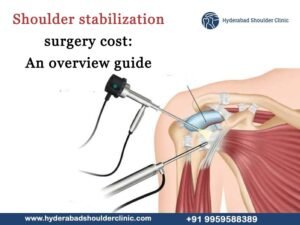Shoulder arthroscopy simply is a shoulder surgery where a tiny camera called an arthroscope is used to examine or repair the tissues inside or around your shoulder joint. A small cut (incision) is made on your skin to insert the arthroscope.
1 – What is Shoulder Arthroscopy?
The rotator cuff is not a single muscle. The rotator cuff consists of a group of muscles along with their tendons that form a cuff-like structure over the shoulder joint. The main role of the rotator cuff is to hold the arm in the shoulder joint and help the shoulder move in different directions. Overuse or an injury can cause the tendons in the rotator cuff to tear.
2- When should I think about Arthroscopy?
Arthroscopy is done when :
- A torn or damaged cartilage ring (labrum) or ligaments
- Shoulder instability, due to which it gets dislocated (slips out of the ball and socket joint)
- A torn or damaged biceps tendon
- A torn rotator cuff
- Bone spur around the rotator cuff
- Inflammation or damaged joint lining is often caused by an illness, such as rheumatoid arthritis.
- Arthritis of the collarbone
- Loose tissue that needs to be removed
- Shoulder impingement, so the surgery will make more room for the shoulder to move around
- Risks of anaesthesia and surgery in general are:
- Allergic reactions to medicines
- Breathing problems
- Bleeding, blood clots, infection.
- Risks of shoulder arthroscopy are:
- Shoulder stiffness
- Failure of the surgery to relieve symptoms
- The repair fails to heal.
- Weakness of the shoulder
- Blood vessel or nerve injury
- Damage to the shoulder cartilage
3- What is the surgical procedure, and Will I be given anaesthesia during the surgery?
For an arthroscopy surgery, general anaesthesia is given, or regional anaesthesia is given. During the procedure:
The surgeon inserts an arthroscope (already connected to a video monitor in the operating room) into your shoulder through a small incision.
The surgeon will inspect all the tissues of your shoulder joint, along with the cartilage, bones, tendons, and ligaments.
The surgeon will repair any damaged tissues with the help of an additional 1 to 3 more small incisions. Extra instruments are inserted through them, and a tear in a muscle, tendon, or cartilage is fixed. The damaged tissue is removed.
The surgeon may do a:
- Rotator cuff repair
- Surgery for impingement syndrome
- Surgery for shoulder instability:
- Ligament repair.

4 – How should I prepare for the surgery?
- One should stop taking blood thinners after discussing them with the prescribing doctor.
- If one has diabetes, heart disease, or other medical conditions, one should be kept in control.
- Alcohol consumption should also be curtailed, or it interferes with wound healing.
- Smoking should be stopped, too, as it can slow wound and bone healing.
- Inform minor details such as cold, flu, fever, herpes breakout, or other illness you may have before your surgery.
5- How does the day of surgery look like?
Stop eating and drinking as recommended by your shoulder surgeon.
There will be special medications that you have to take that day.
Arrive on time and ensure that you have someone to be there during the surgery.
6- How long will it take to recover from the surgery?
After the procedure, please follow any discharge and self-care instructions.
It will take 1 to 6 months for recovery. The first week you will be in a sling, and If you had a lot of repairs done, you might have to wear the sling longer.
Pain medication is also given since you will start feeling the pain after the anaesthesia wears off.
Your ability to play sports will depend on what your surgery involves, ranging from 1 week to several months.
Physical therapy is recommended to regain motion and strength in your shoulder. How long you do the therapy depends on what was done during your surgery.
7 – Are there any alternatives to surgery, and will these alternatives have similar long-term outcomes?
Find out if therapy, exercise, and medications can solve the problem.
8 – Any complications with this type of surgery?
- Find out if your range of motion will get limited.
- If I stop blood thinning medication, will that be an issue?
- Will there be any complications due to anaesthesia?
- When can I drive again?
9 – How many days should I stay at home following the surgery?
10 – What is the realistic outcome after the surgery?
- Will my pain completely go away?
- Will the damaged shoulder ligaments and tendons completely return to normal?
Dr Chandra Sekhar B is one of the most distinguished shoulder surgeons. He has treated many patients, including sports personalities. As with any medical procedure, being informed is vital. Express your expectations and make sure they are realistic. Note down beforehand and take that list and write down the answers. For more information, visit https://hyderabadshoulderclinic.com/ or contact us on
+91 9959588389, shoulderandsportsclinic@gmail.com





